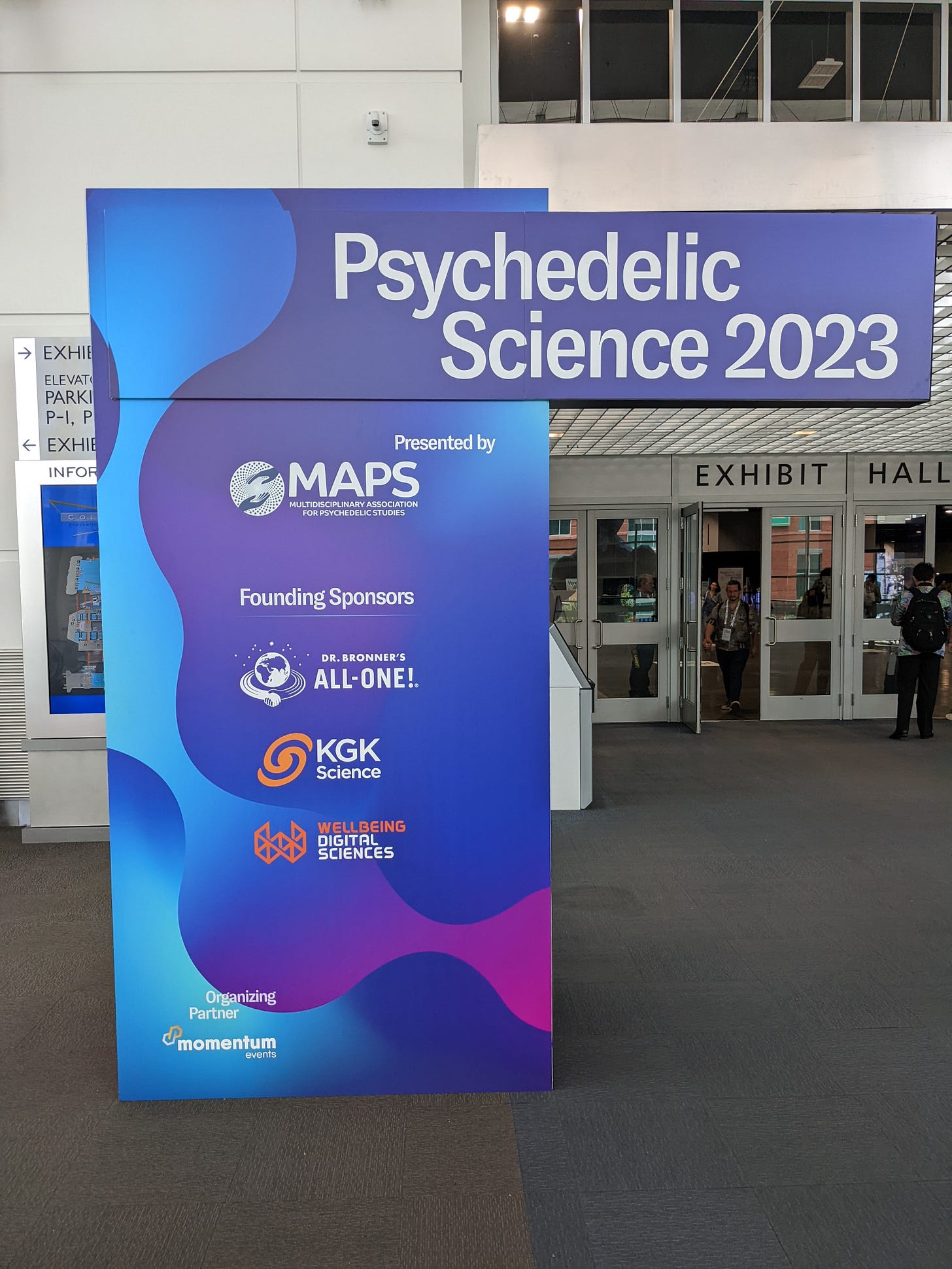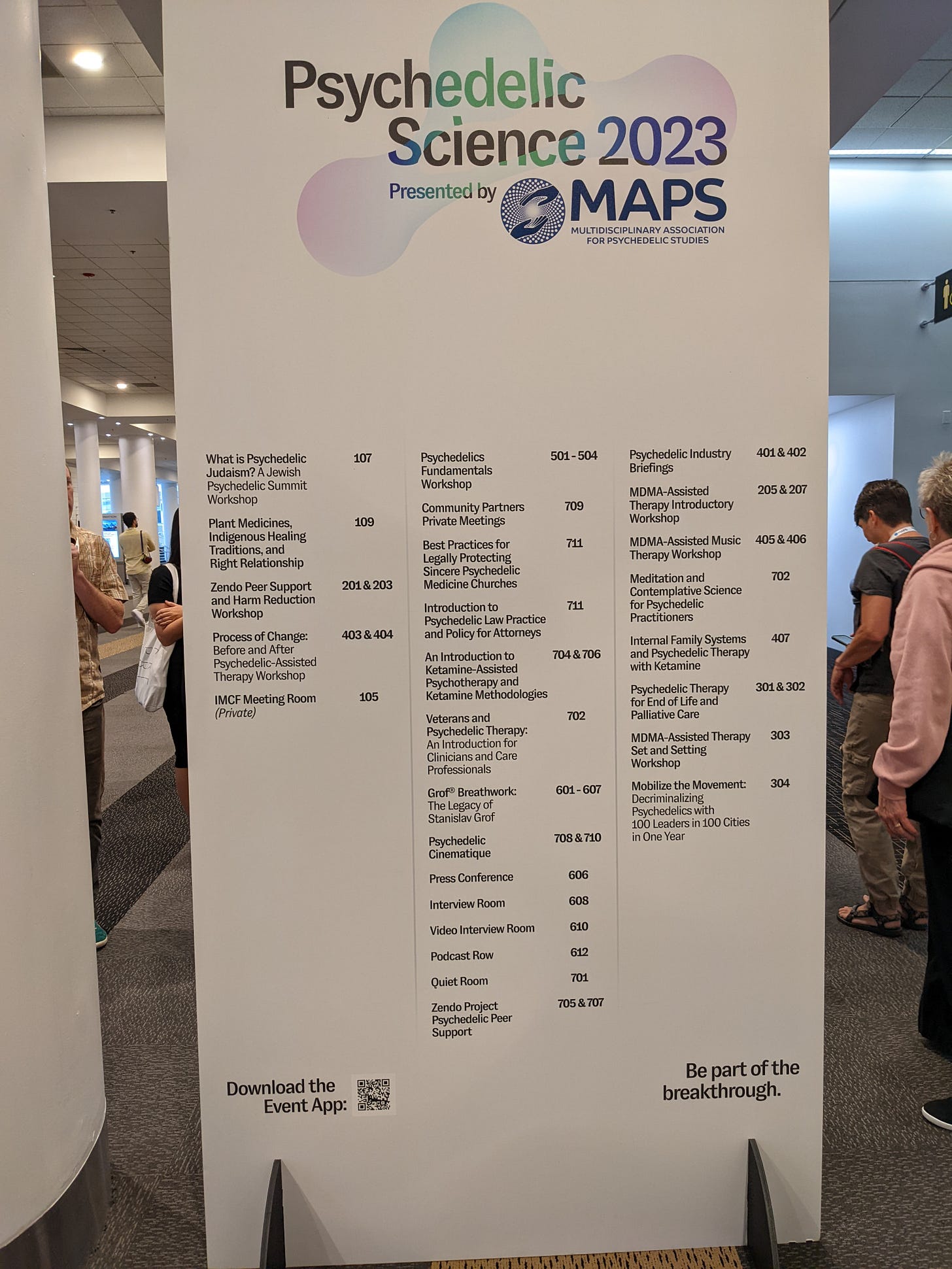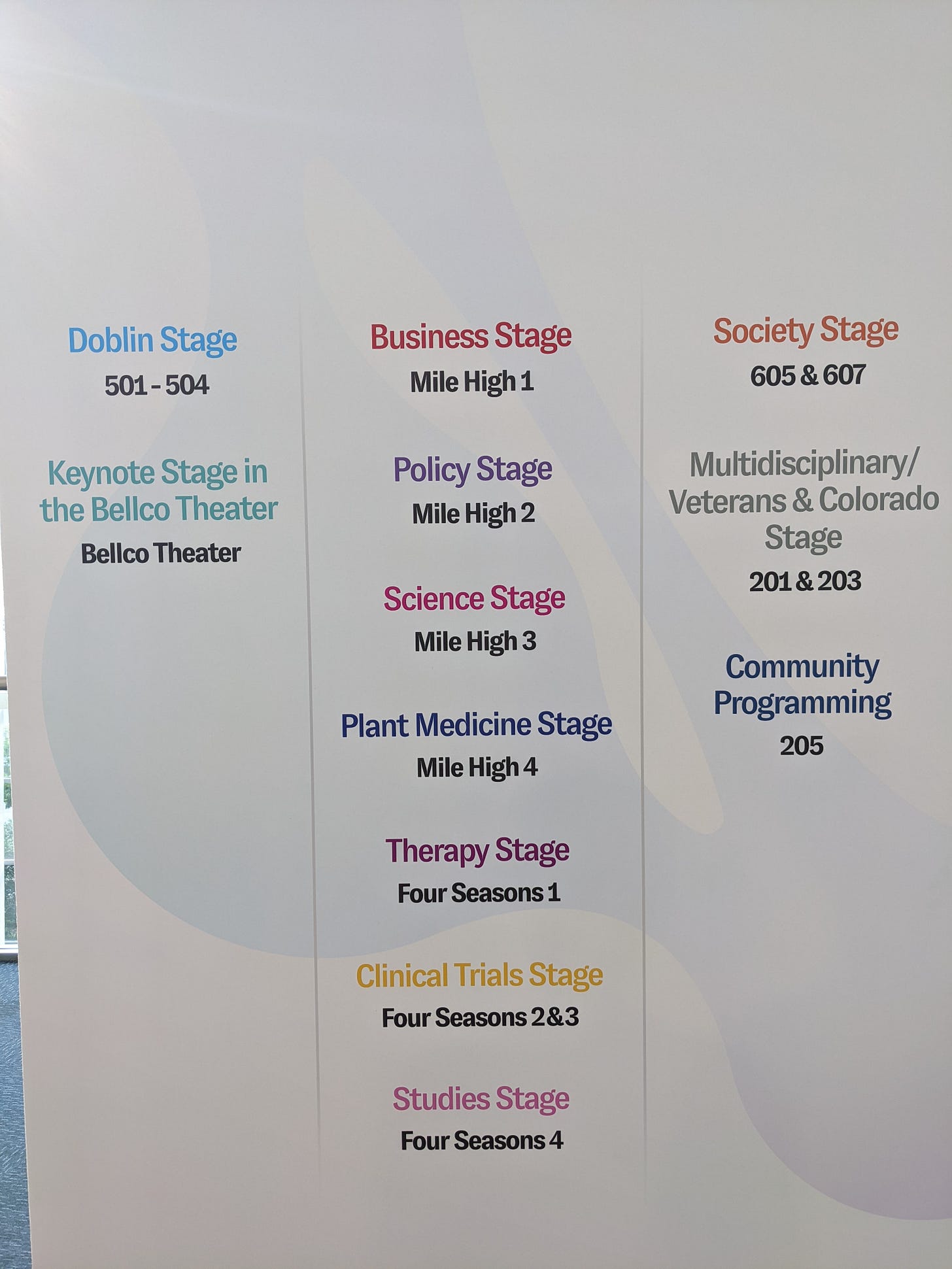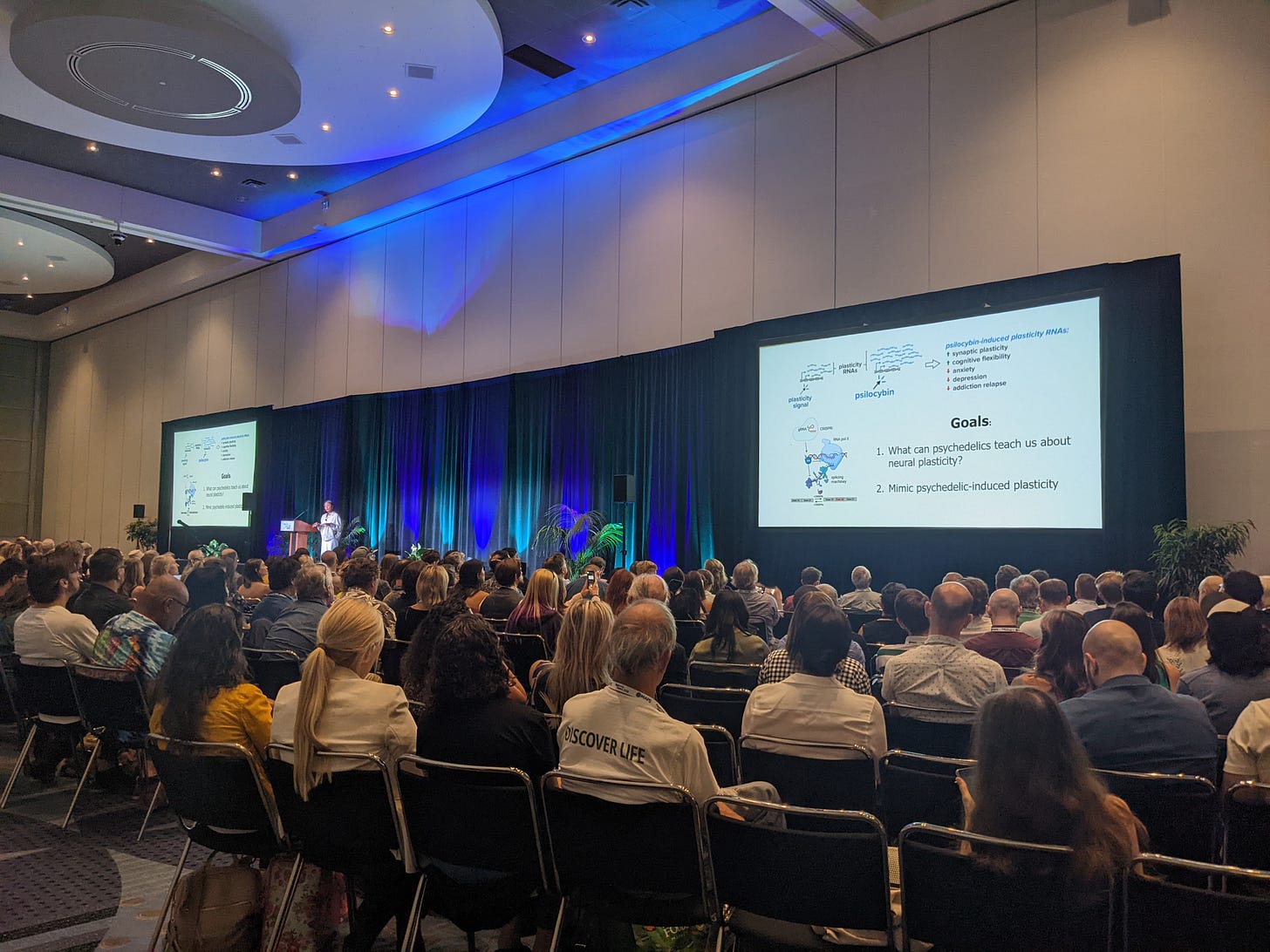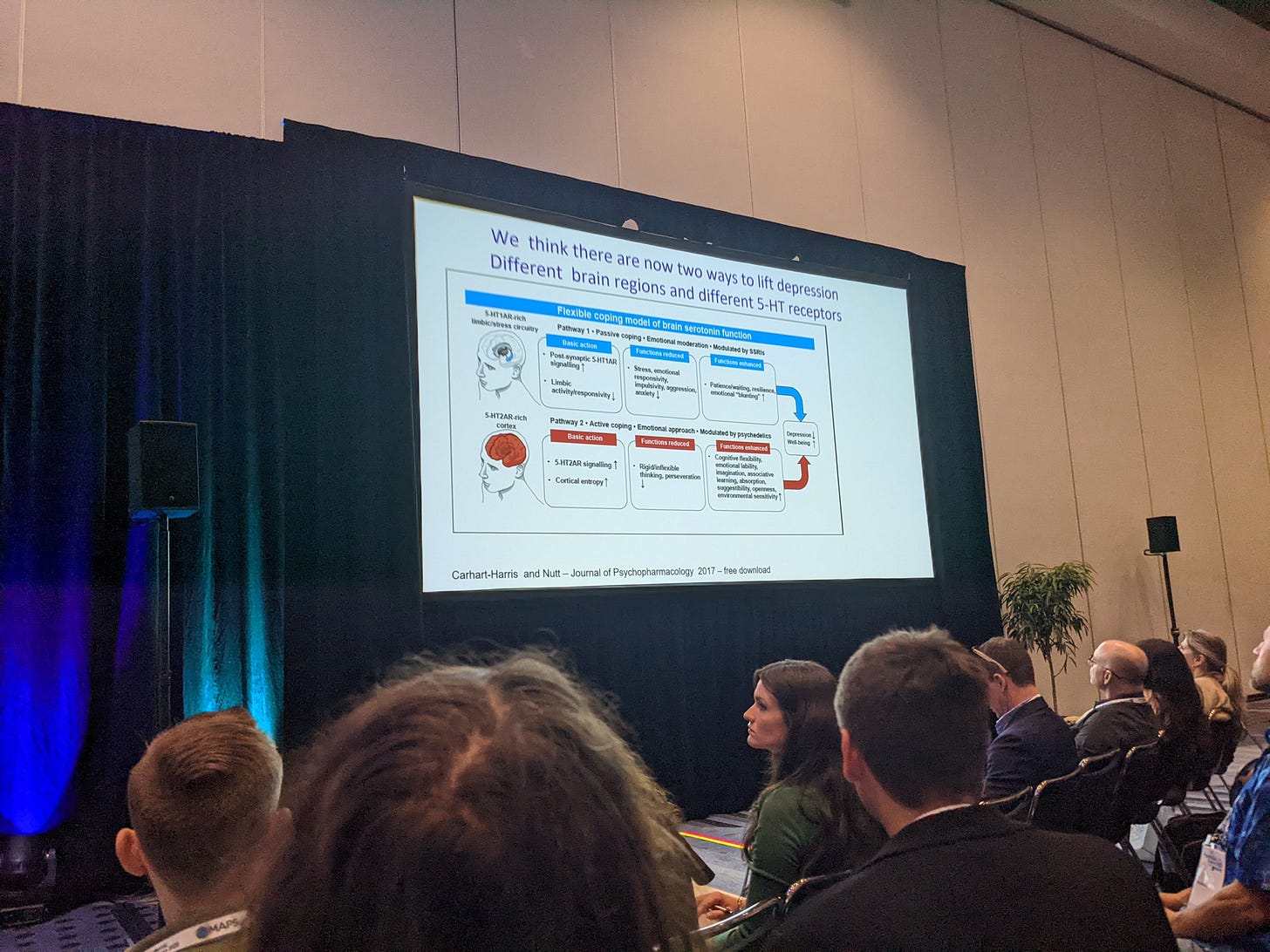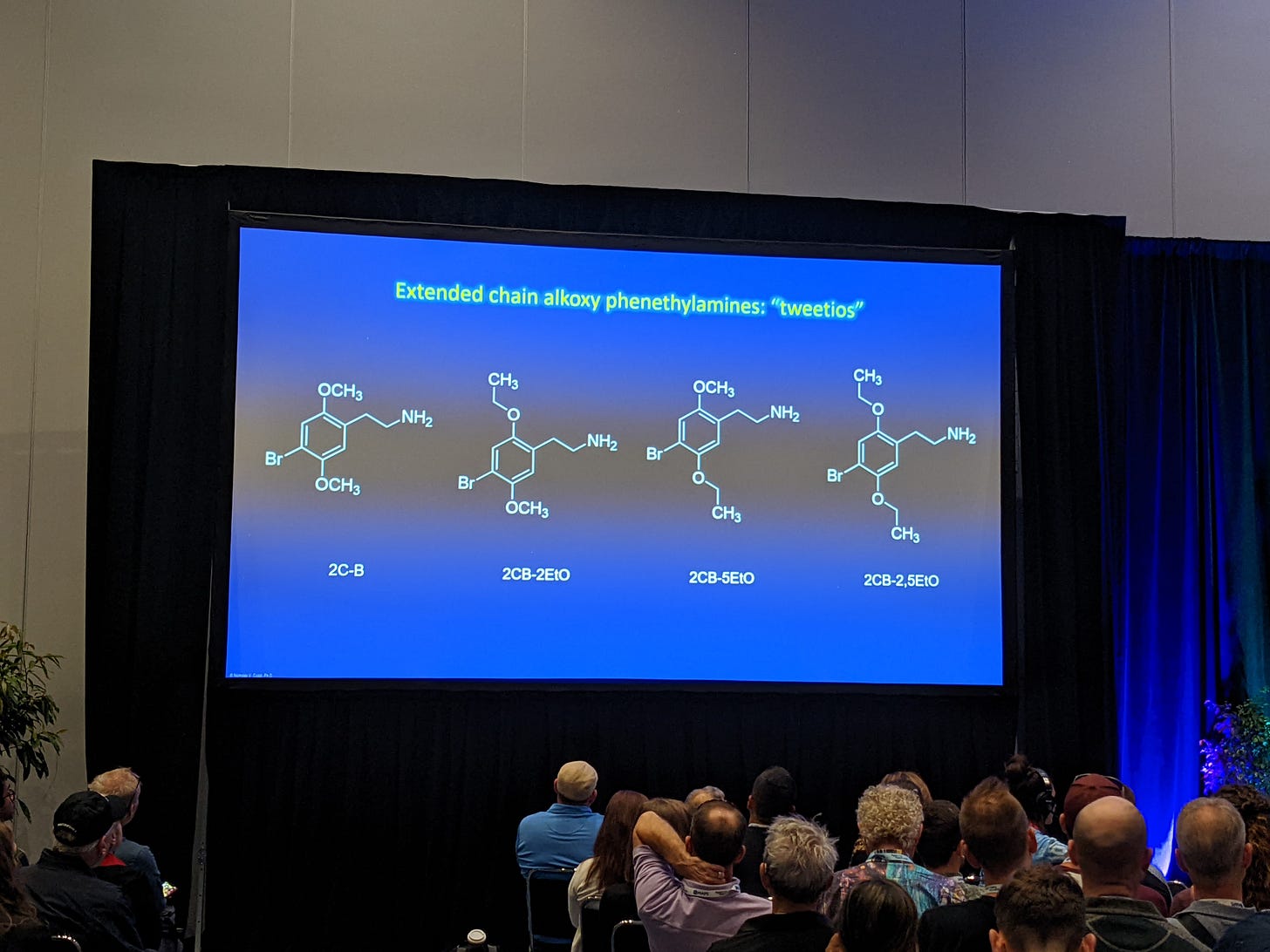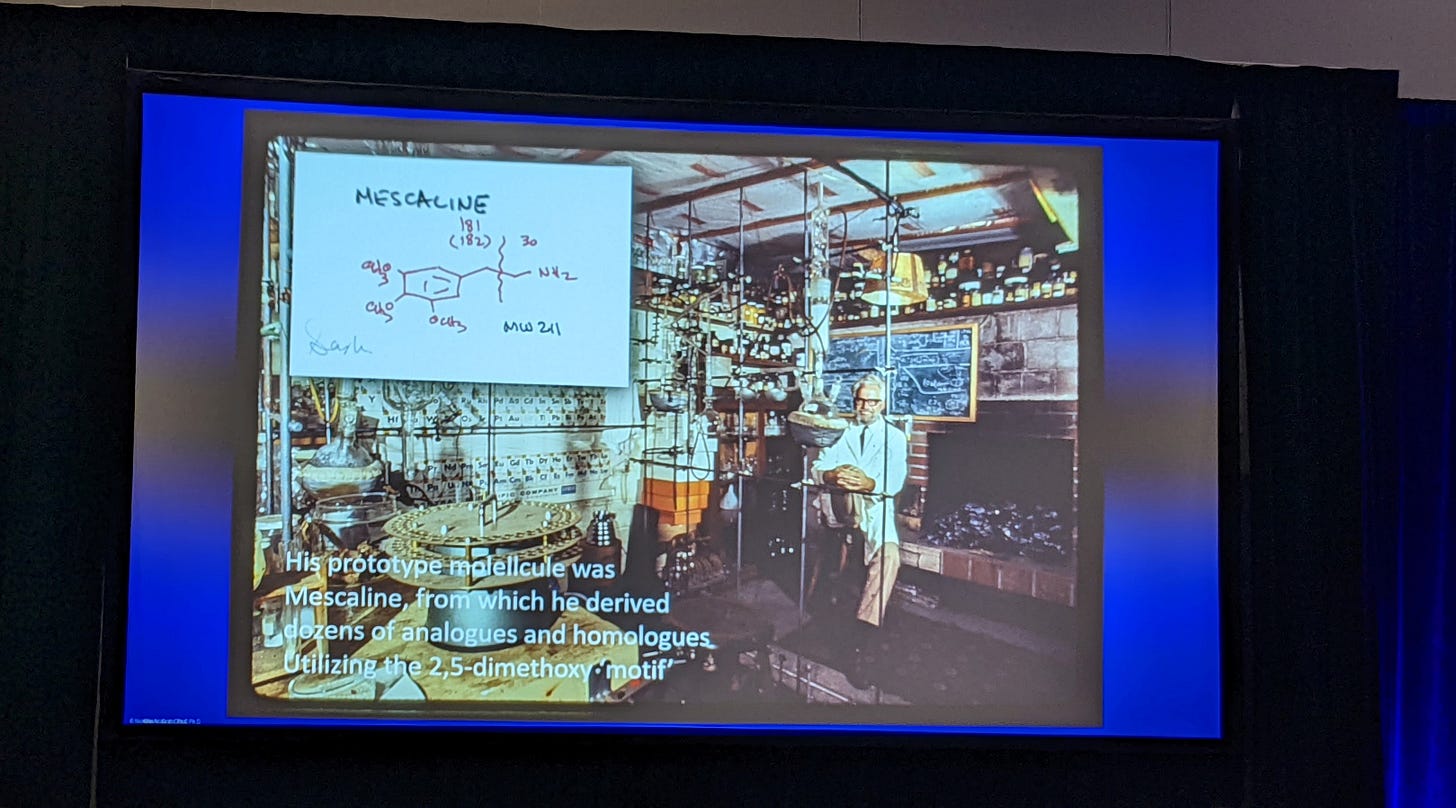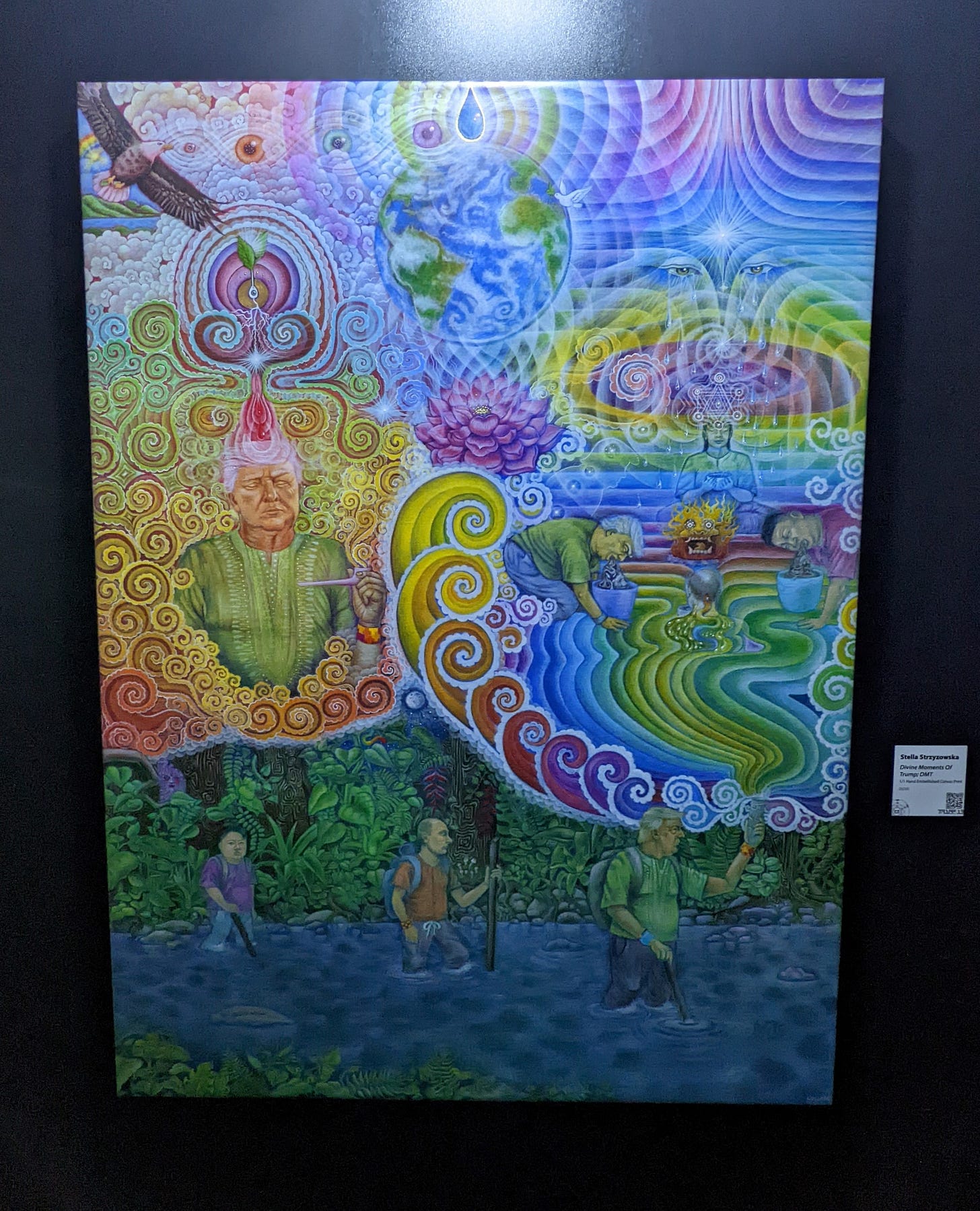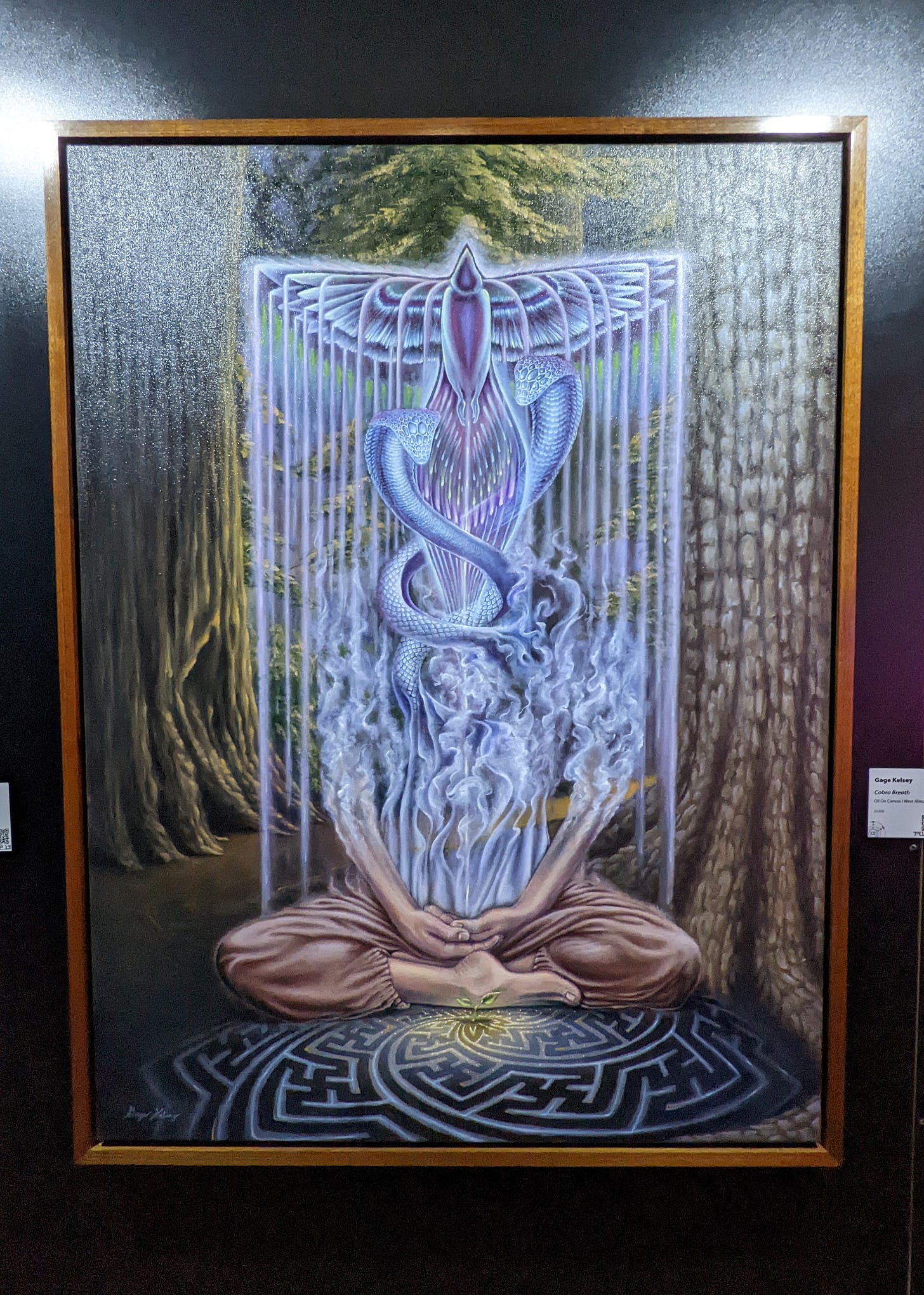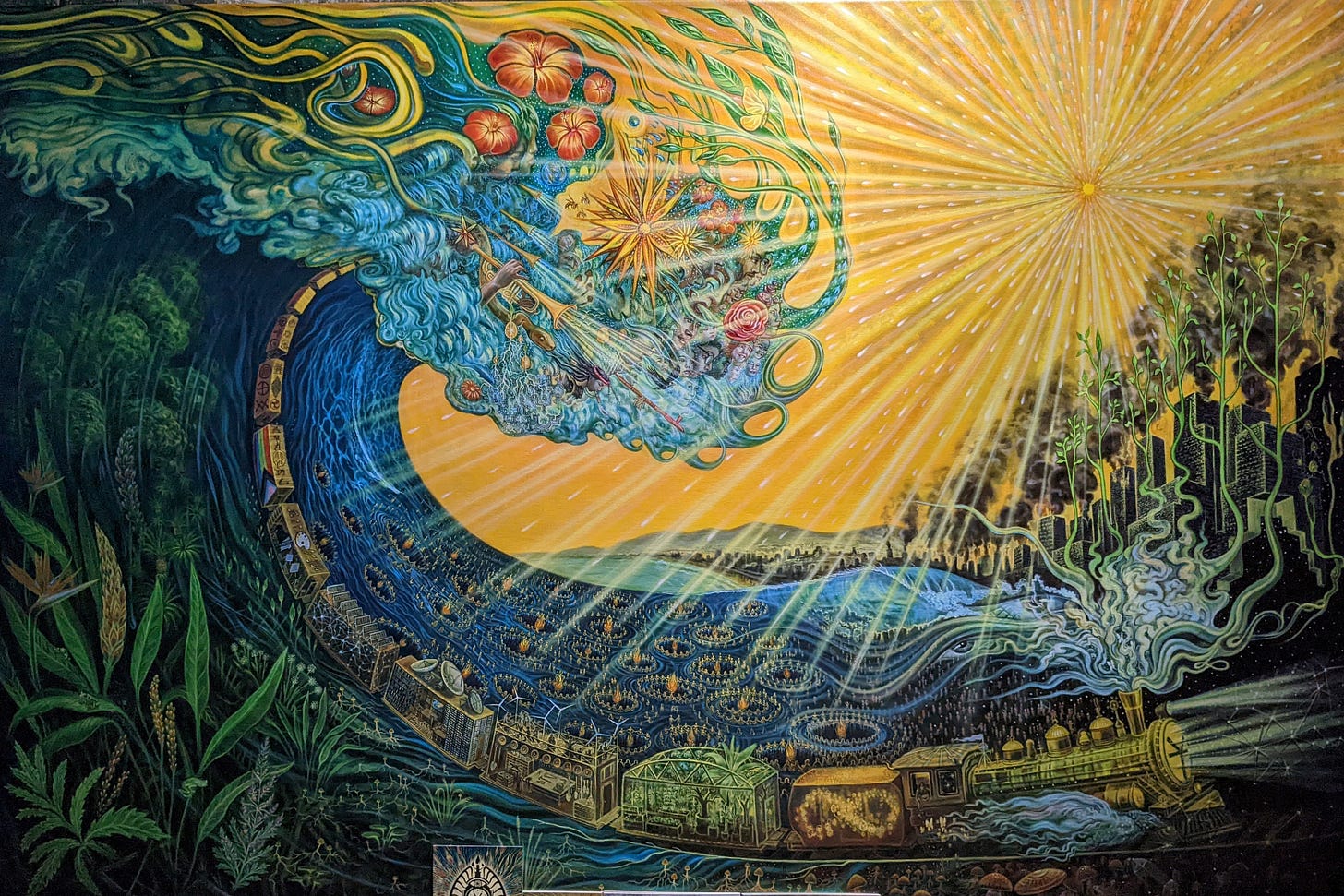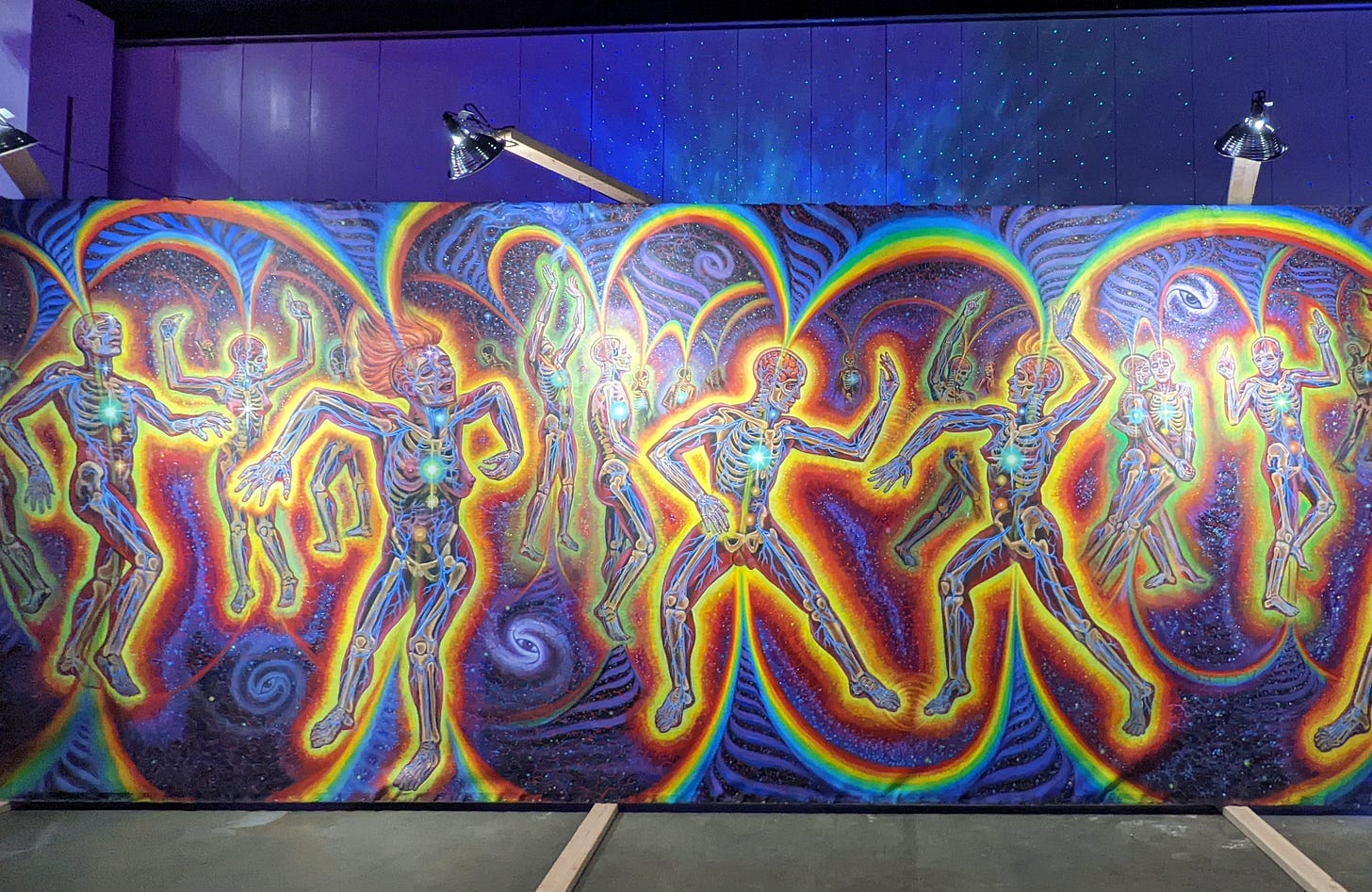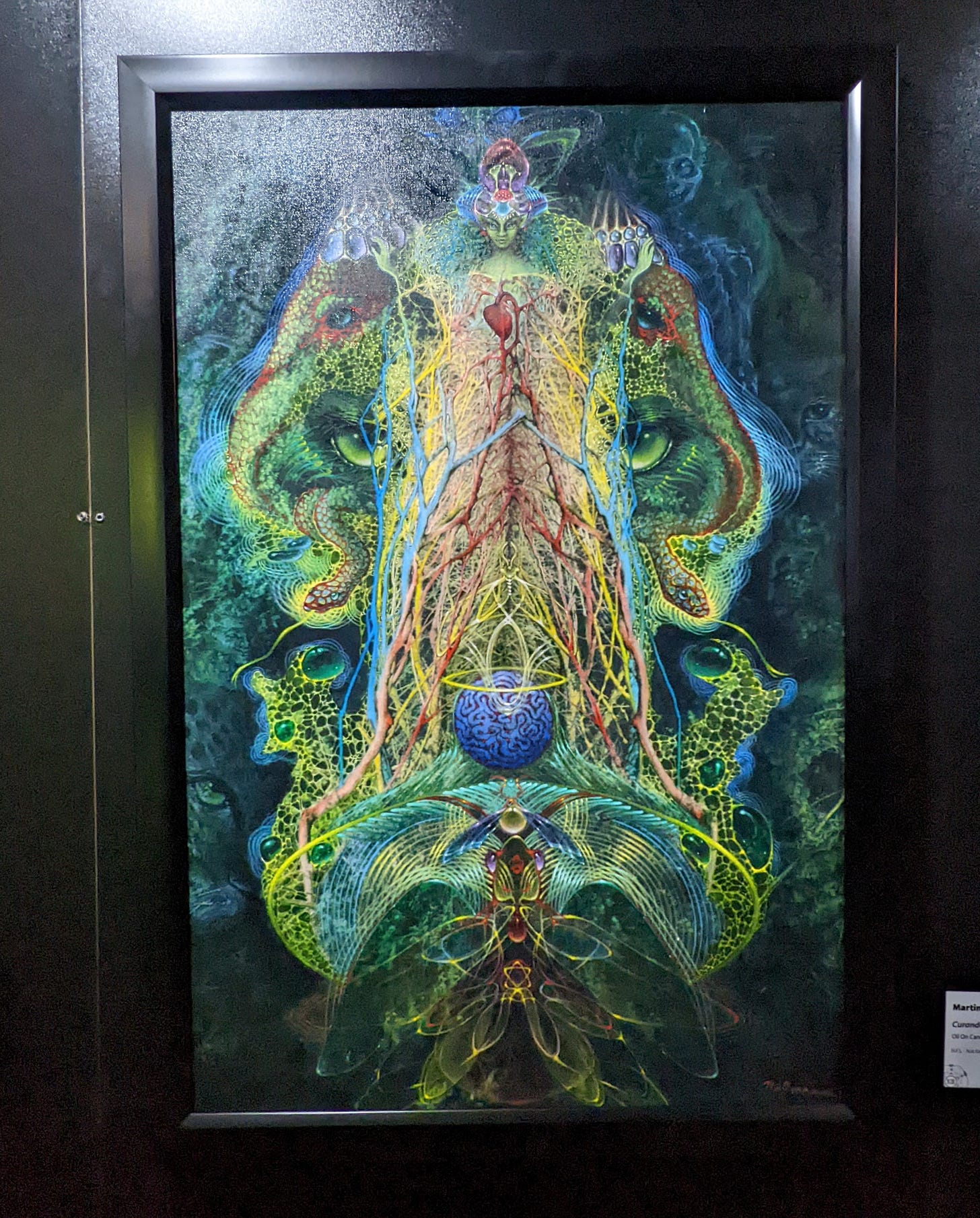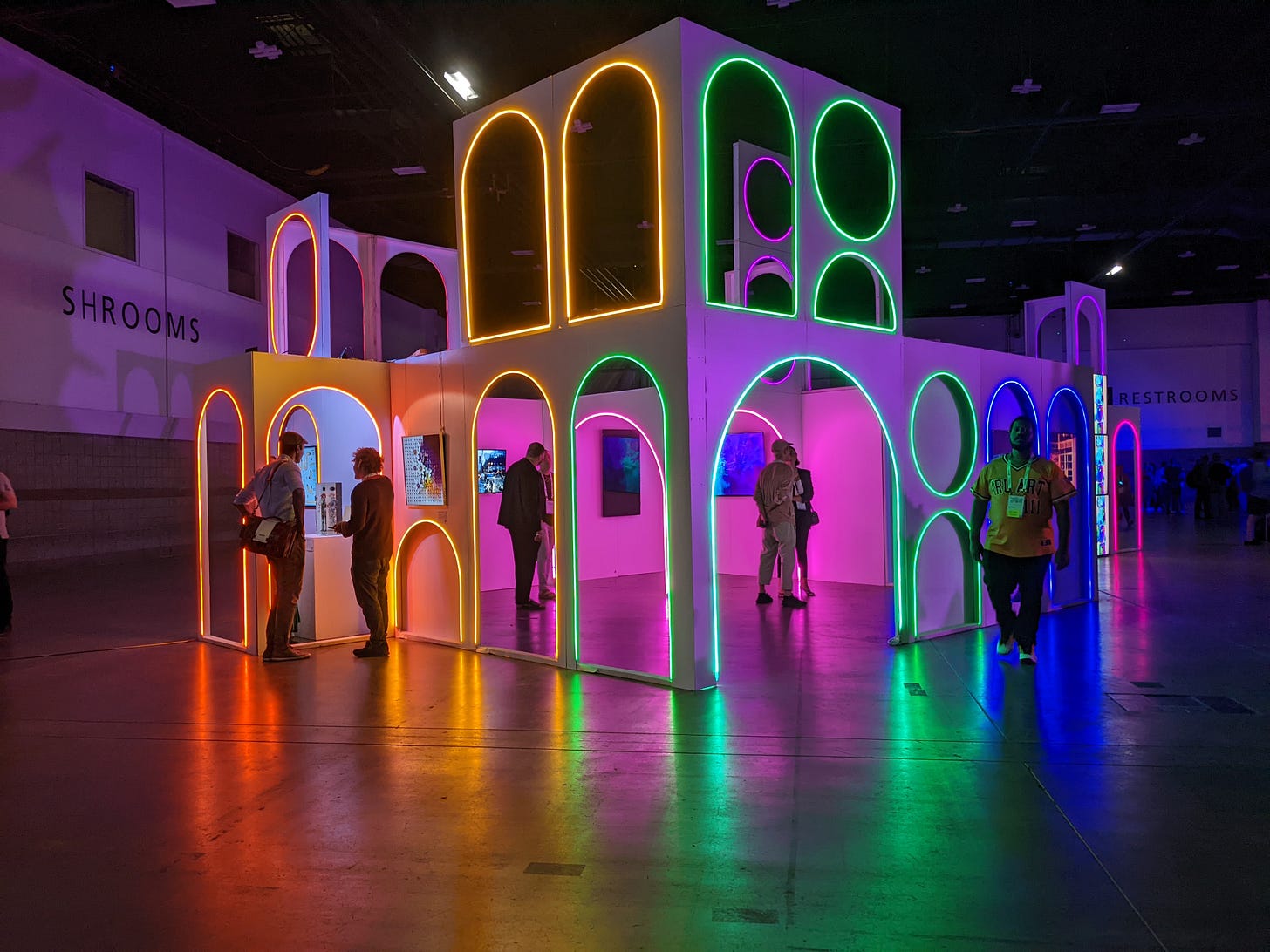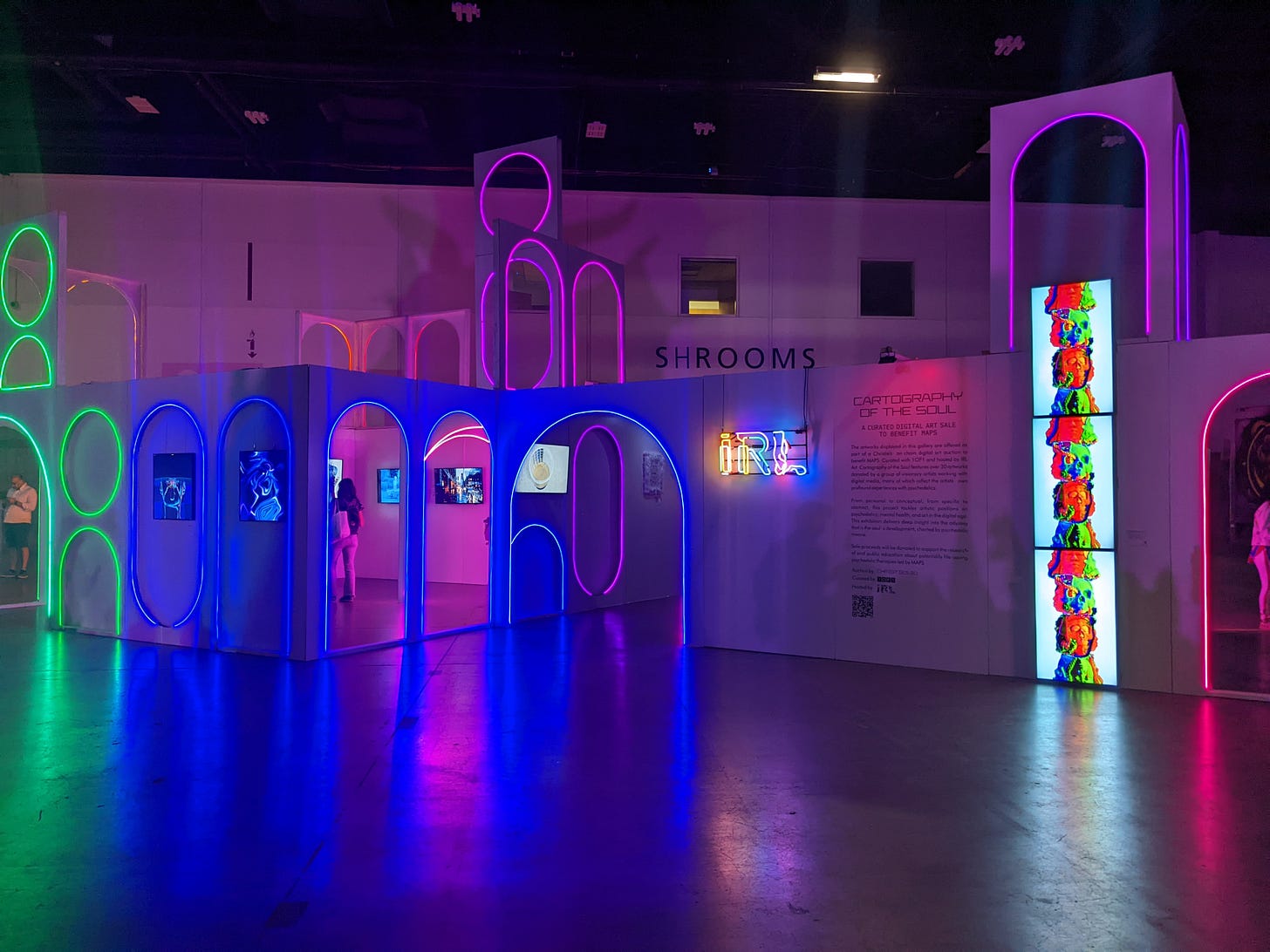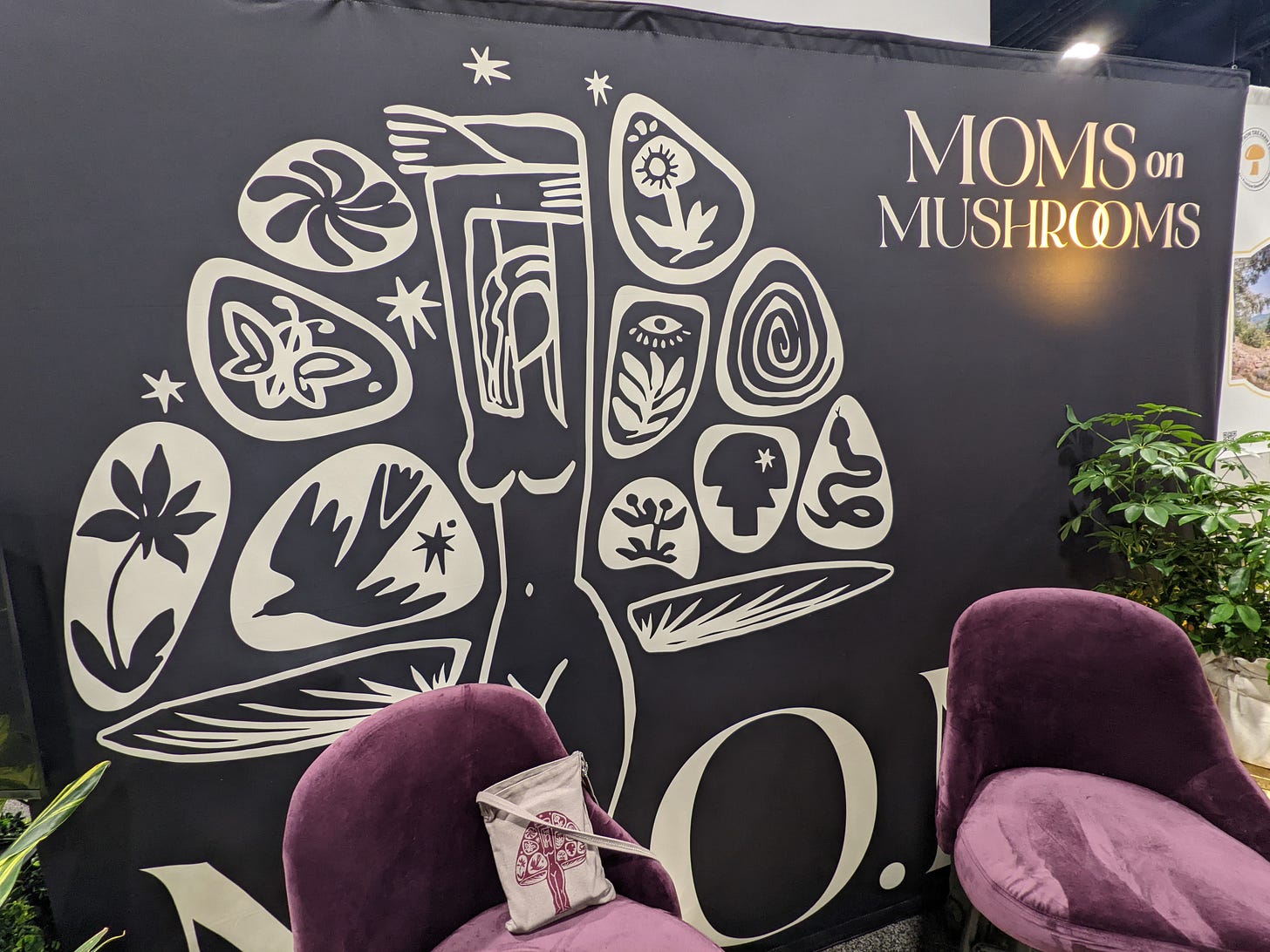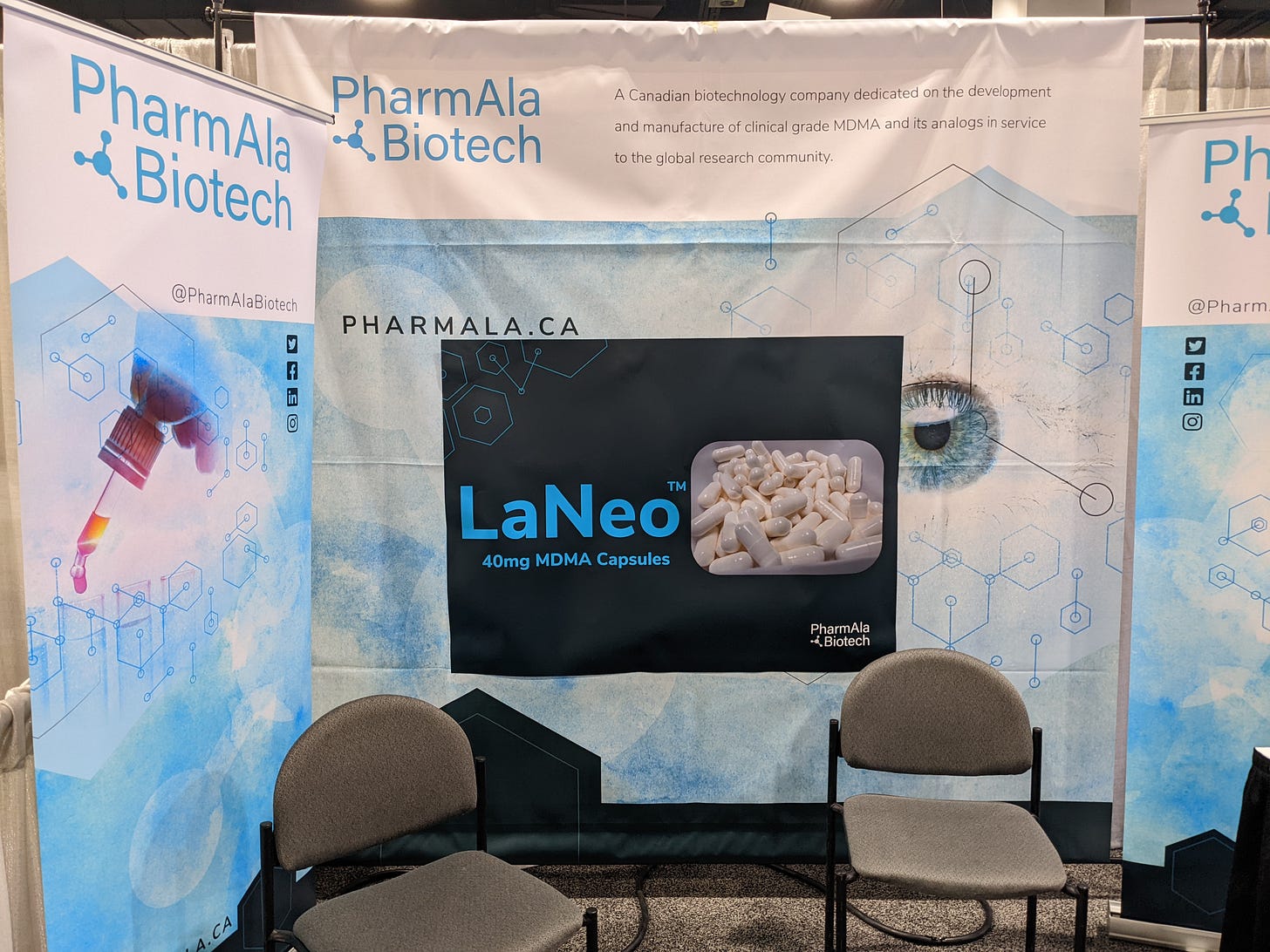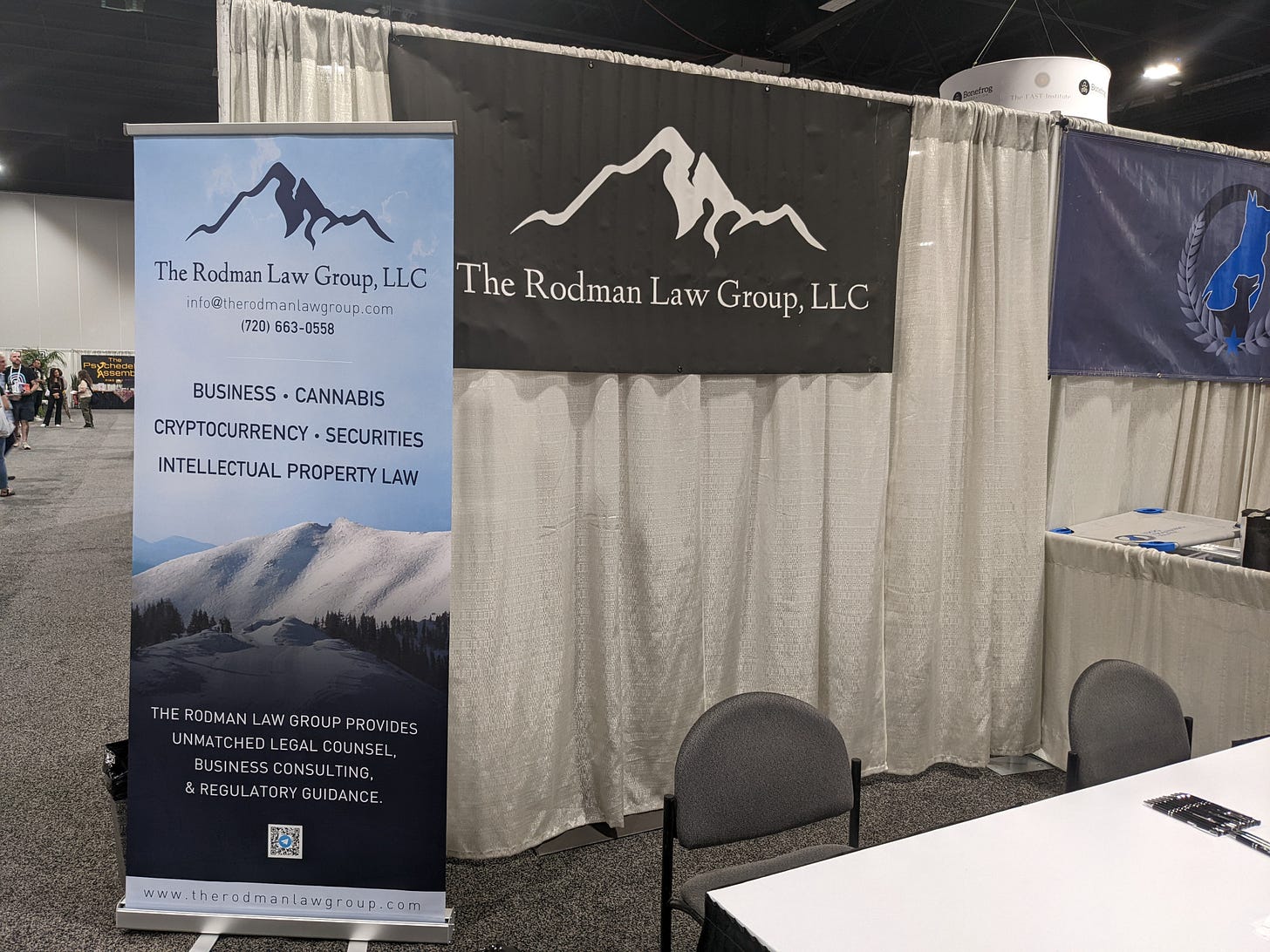Inspired by APA Meeting: A Photo-Essay. There are lots of photos - it’s probably best viewed on the Substack site, not your email. Click here for that.
The first thing you notice when you attend Psychedelic Science 2023 (PS23), is that a lot of people are interested in psychedelics. Over 11,000 people gathered in Denver, Colorado, for the touted ‘largest psychedelic gathering in the history of the universe.’ This is mostly a photo essay, and I've tried to avoid posting pictures with people in them, even crowds. But trust me; there are a lot of people interested in psychedelics. Enough interest for over 11,000 people to spend $800+ on a base ticket and travel from around the world. As an example, sitting next to me on my first day was a Uraguain physician. In the lunch line on the third day, I chatted with a Canadian psychiatrist and therapist. While this was US-centric given its location, the point is a lot of people are interested in psychedelics.
The second thing you notice at PS23 is that it is an eclectic bunch, but there are themes.
- The Elderly Gentleman: wearing a polo, blissfully walking around absorbing everything at face value. They have no psychology or medical background. They recently discovered psychedelics aren't the devil by watching Michael Pollen’s How to Change Your Mind or Paul Stamet's Fantastic Fungi. They are carrying the free goody bag on their shoulder.
- The Initiated: likely in their 20s to 30s. In tie-dye, elephant pants, or loose flowy clothes. If applicable, has a man bun. They've ‘done the field work’ in this space already. Completely at ease with everything, unless someone suggests the spirit of a molecule doesn't need to be considered in our understanding of it. Has no baggage in life, and thus carries no bag.
- The Professional - probably a professor from a prestigious university (Johns Hopkins, Brown, Yale, UCSF, Imperial College, and Princeton are some literal examples). If not, maybe a lawyer or physician. They are quiet and awkwardly look around like ‘Am I supposed to be here?’ during panels where things outside traditional 'science' are being clapped for. But they ultimately clap along so as not to offend anyone. That would be bad, of course. The bag of choice is a satchel.
This is an exaggeration poking fun at multiple parties. Don't cancel me.
The third thing you notice at PS23 is that, like all true conferences, there are sponsors.
This year, the Founding Sponsors are the people who make your soap, a Canadian clinical research consulting company, and ‘an evidence-based mental healthcare company focused on the development and implementation of innovative clinical solutions, such as psychedelic medicine and digital therapeutics’.
I'm glad their website let me know they were evidenced based!
That'll set them apart from the non-evidence-based mental healthcare companies focused on the development and implementation of innovative clinical solutions, such as psychedelic medicine and digital therapeutics.
The fourth thing you notice at PS23 is that-
- advertisements for smoking devices intrusively pop up on the official app.
I guess capitalism and the attention economy have even invaded the counterculture. Seems ironic; like Google having a booth at Burning Man. Truly, nowhere is safe. I guess psychedelics aren’t ‘cool’ anymore. Is this a good thing?
The fifth thing you notice is that, just like the attendees, there are a diversity of types of events going on at PS23.
Jewish? We have a workshop for you!
Want to have a Non-Ordinary State of Consciousness (NOSC) without doing drugs? We have a breath session for you!
Have millions of dollars to invest in the psychedelic space? We have just the industry briefings for you!
Is Big Government trying to limit your church’s right to psychedelic experiences? Join us in fighting the system (for a hundred-dollar fee)!
Below is an example session from each of the ‘Stages’ above. I can't express enough how wide-ranging the topics are.
Business Stage
The state of the psychedelic sector
Josh Hardman
This talk aims to provide a rapid introduction to the state of the nascent psychedelic sector, fertilising the ground for more substantive discussions on this track. Helped along by data visualisations, Hardman surveys the financial, research and policy contexts in which psychedelic businesses are embedded; and, increasingly, are shaping. The talk finishes by reviewing a number of open questions surrounding the future of the psychedelic sector, from its unfolding clinical evidence base to its commercial viability.
Policy Stage
Perspectives on the landscape of state and federal reform
Brett Waters, Esq. | Seema Sadanandan | Kathryn L. Tucker, J.D. | Matt C. Zorn
Join a diverse array of experts and advocates as they shed light on the ever-evolving intricacies and challenges of psychedelic policy reform at both levels of government. This insightful opening discussion will set the stage for the day, offering perspective on how to navigate the complexities of state and federal law including the topic of federalism, the role of grassroots movements and expert leverage, and the potential for collaborative approaches across the sector. Join us as we illuminate the multi-faceted tapestry of state and federal reform, forging a path toward more equitable, evidence-based, and transformative drug policies.
Science Stage
Exploring the Use of Human Brain Organoids to Study Psychedelics
Stevens Rehen, Ph.D.
Brain organoids are tiny, three-dimensional structures that look like miniature brains. They are created in the lab from induced pluripotent stem (iPS) cells reprogrammedfrom skin or urine cells of human volunteers. These live pieces of human brain tissue are grown to study how the brain forms, how brain diseases develop, and the effects of drugs and other factors in neuronal cells. We have taken a cutting-edge approach to investigate the effects of psychedelics on brain organoids, including substances such as LSD, 5-Meo-DMT, psilocin, and Ayahuasca's beta-carbolines. Our recent findings shed new light on their mechanisms of action beyond neuroplasticity, indicating howpsychedelics may have therapeutic potential for conditions like inflammation and neurodegeneration. Working with clinicians, psychologists, and other experts, the use of brain organoids has the potential to greatly expand our understanding of psychedelics and help develop new therapeutic strategies. Our research addresses a number of key translational questions, including the potential for alternative mechanisms, efficacy in different neural cell populations, and emerging properties including human neurotoxicity of new psychoactive substances. This research is an important step toward a better understanding of the effects of these substances on the human brain, including consciousness.
Plant Medicine Stage
History and archeology of psilocybin mushrooms in Mesoamerica
González Romero Ph.D.
This talk aims to show a brief overview of the archeological and historical evidence regarding the use of psilocybin mushrooms in Mesoamerica, especially among the Maya, Mixtecs, and Aztecs. This research includes the study of primary sources such as codices, ceramics, sculptures, lithic artifacts, and even colonial manuscripts in a chronological timeline to achieve a better understanding. The goal of this talk is not to provide a dogmatic truth due to the controversial character of the archeological records. Its purpose is to stimulate interpretations supported by scientific evidence and a humanistic approach. This interdisciplinary research requires the implementation of different methodologies such as iconography, historiography, and hermeneutics. This talk is part of broader research that aims to analyze, from a cross-cultural perspective, the ritual, therapeutic and philosophical uses of psychedelic mushrooms. Keywords: Psychedelic, Mushrooms, History, Archeology, Mesoamerica.Osiris Sinuhé
Therapy Stage
Building community-oriented therapy practices
Akua Prieto Brown, M.D.
As the field of psychedelic mental healthcare emerges, practitioners and care centers have the opportunity to shape their practice around one of the greatest resources available to patients: community. What might it mean to take a systems-level, community-focused approach to creating experiences that are safe, accessible, and have meaningful benefits? Join us to consider the structures and cultures that facilitate connection and support for both patients as well as the professionals delivering care.
Clinical Trials Stage
Pragmatic Trial of Psilocybin Therapy in Palliative Care: A Multicenter Trial of Psilocybin Therapy for Demoralized Adults Near the End of Life
Anthony P. Bossis, Ph.D. | Charles S. Grob, M.D. | Jessi Humphreys, M.D.
This presentation will provide an overview of a multicenter clinical trial evaluating the efficacy and safety of psilocybin therapy compared to active control in treating demoralization in adults near the end of life. Additional objectives will evaluate the efficacy for treating depression and anxiety, and for addressing effectiveness on quality of life, spiritual well-being, and hopelessness. Demoralization is a clinically significant and measurable form of existential distress characterized by myriad features including poor coping and a sense of helplessness, hopelessness, a loss of meaning and purpose in life, and is associated with a desire for a hastened death. Demoralization is a common presentation of existential distress in patients with advanced disease and at the end of life. Distinguishing elements of this trial in psychedelic research include (1) demoralization as a primary clinical endpoint; (2) inclusion of non-cancer diagnoses; (3) the trial is embedded in palliative care (not psychiatric) settings; (4) utilization of an apprenticeship model for training palliative care and other non-mental healthcare providers in psychedelic therapy.
Studies Stages
What Will People Think? Revealing Public Knowledge, Belief, and Perceptions of Psychedelics
As the psychedelic field experiences exponential growth, many of its goals will be directly affected in significant ways by what the general public knows and believes about psychedelic substances. But aside from narrowly focused opinion research tied to specific political efforts, the field has not had an evidence-based understanding of those public perceptions and knowledge. Until now. In this session, Berkeley Center for the Science of Psychedelics executive director Imran Khan will present the findings of the inaugural Psychedelic Insight Poll, a national baseline survey that serves as the cornerstone of a multi-year opinion research program launched by BCSP in 2023 to provide the entire psychedelic community with data-driven insights into the general public’s beliefs, hopes, fears, and questions about psychedelics and psychedelic therapies. The Psychedelic Insight Poll will be conducted annually to more fully understand public perceptions, track how those perceptions shift over time, and examine how current events, research discoveries, media and communications efforts, business strategies, and other activity in the field are influencing those shifts.
Society Stage
Sex and Psychedelics: Weaving Altered States for Healing and Pleasure
Laura Mae Northrup, MFT | Britta Love | Leticia Brown, MFT
Where does sex fit into our cultural conversations on psychedelics? How does one go about weaving the erotic with the psychedelic? Join somatic sex educator Britta Love, somatic psychotherapist Laura Mae Northrup, and sex therapist Leticia Brown for a conversation about consent, altered states of consciousness, and how psychedelics can shift our relationship to our erotic selves, moving us towards deeper pleasure and more embodied play.
…
Two people could practically be attending separate conferences depending on what they choose to attend (and with sessions running simultaneously, you're forced to choose what to attend). This leads to a lot of contradictions. Some people proudly hold up the pending FDA approval as a stamp of legitimacy. Others are unwilling to state that science is ‘good’ and insist that all that is needed is to trust our ancestors. Some people intently listen to the safety profiles in clinical research this far; others raise their hand to ask if telepathy via crystal energy should exclude research participants the same way a diagnosis of schizophrenia does. One talk shaming psychedelic tourism1 while there are raffles to win trips for psychedelic experiences on Peru in the introductory goody bag. It's called plant medicine, but also synthetic psychedelics are advertised.
I think this is an inevitable clash of world views in those who have an interest and/or experience with psychedelic compounds (or perhaps NOSC broadly). But the noetic subjective experience of psychedelics really seems to just grab hold of people in ways other things don't.
For all the curiosity I have for psychedelic space, there are elephants in the room, and I don't see a door to let them out.
The fifth thing you notice at PS23 is that, thankfully, a lot of people are interested in the neuroscience. I wasn't able to sit down the first day because, among other things, it was standing room only.
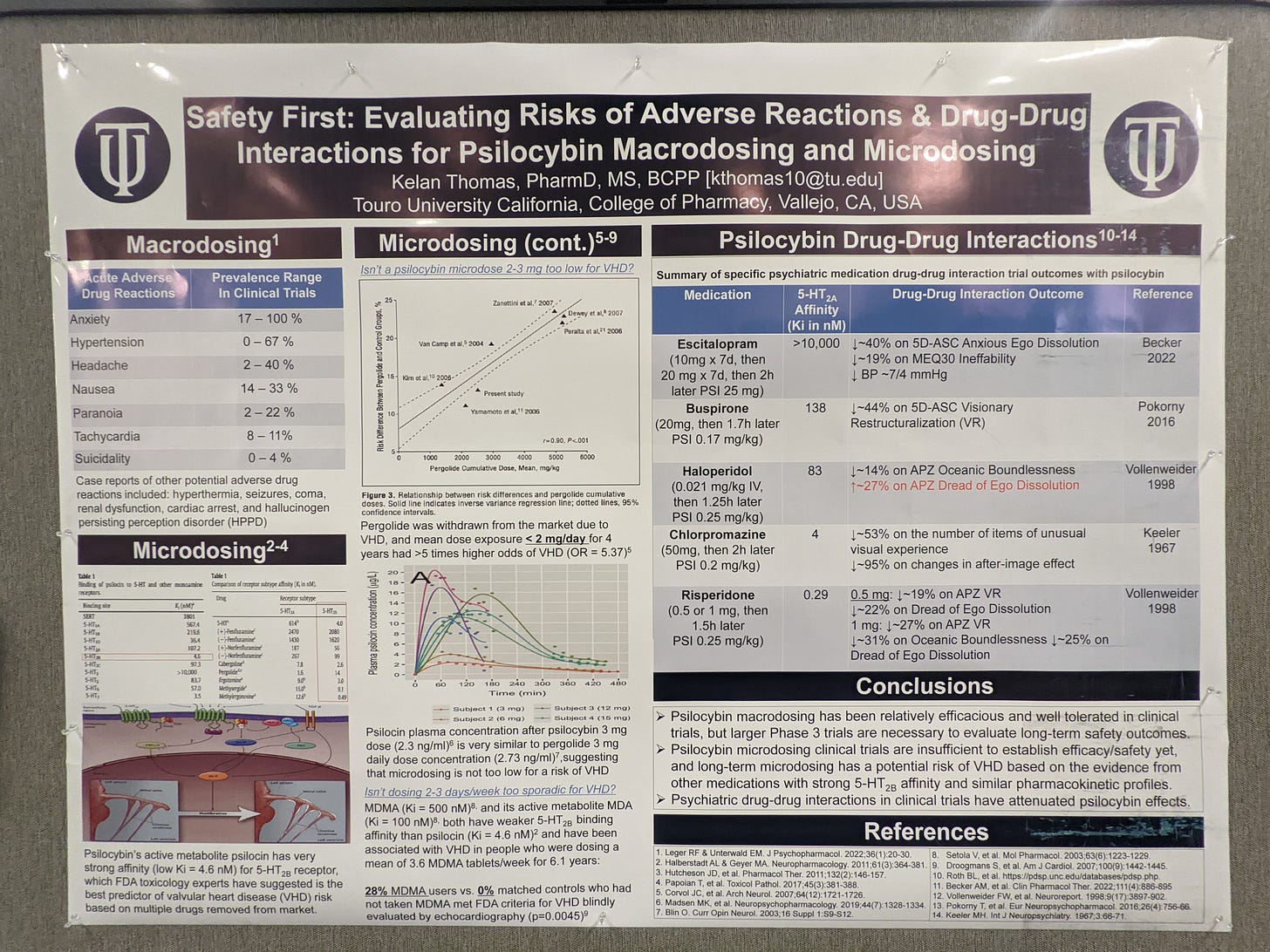
Summary - many psychedelic compounds have a growing body of positive literature that, by most standards would be really promising2. But because of the stigma, limitations of the current healthcare infrastructure, and the fact it ‘occasions one of the most profound experiences of participant’s life’ - things are slow to pass regulatory hurdles. I'm probably in the minority at the conference that agrees with this decision. This is our second attempt at bringing psychedelics ‘public’ (the first failed attempt being the 1960’s/1970's). I don't know if we'll get a third attempt. Let's not mess this one up.
When you slightly tweak molecules, their effects change. What if someone just slightly tweaked a bunch of psychedelics in a systematic order and gave a rich written account of the effect on duration, phenomenological changes, etc. That happened. The book is called PiHKAL (Phenethylamines I Have Known and Loved). It’s written by a person named Sasha - his life is an interesting story.
There is a lot of science to judge and evaluate, but that’s not the goal of this post. So moving on.
The sixth thing you notice at PS23 is a lot of psychedelic-inspired art.
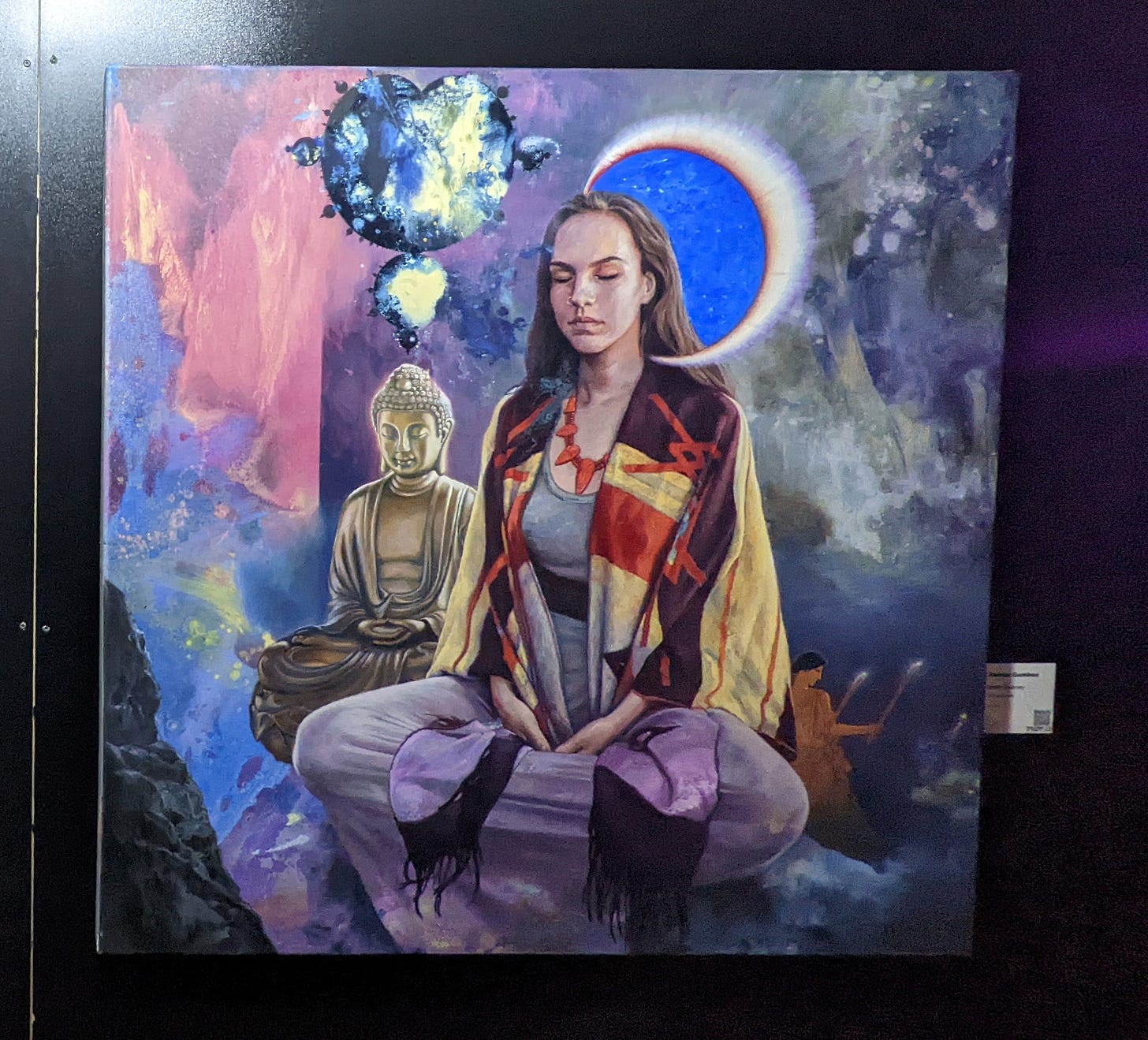
The seventh thing you notice while wandering around PS23 is an NFT auction with prices listed in Ethereum.
The eighth thing you notice is the range of ‘exhibits’.
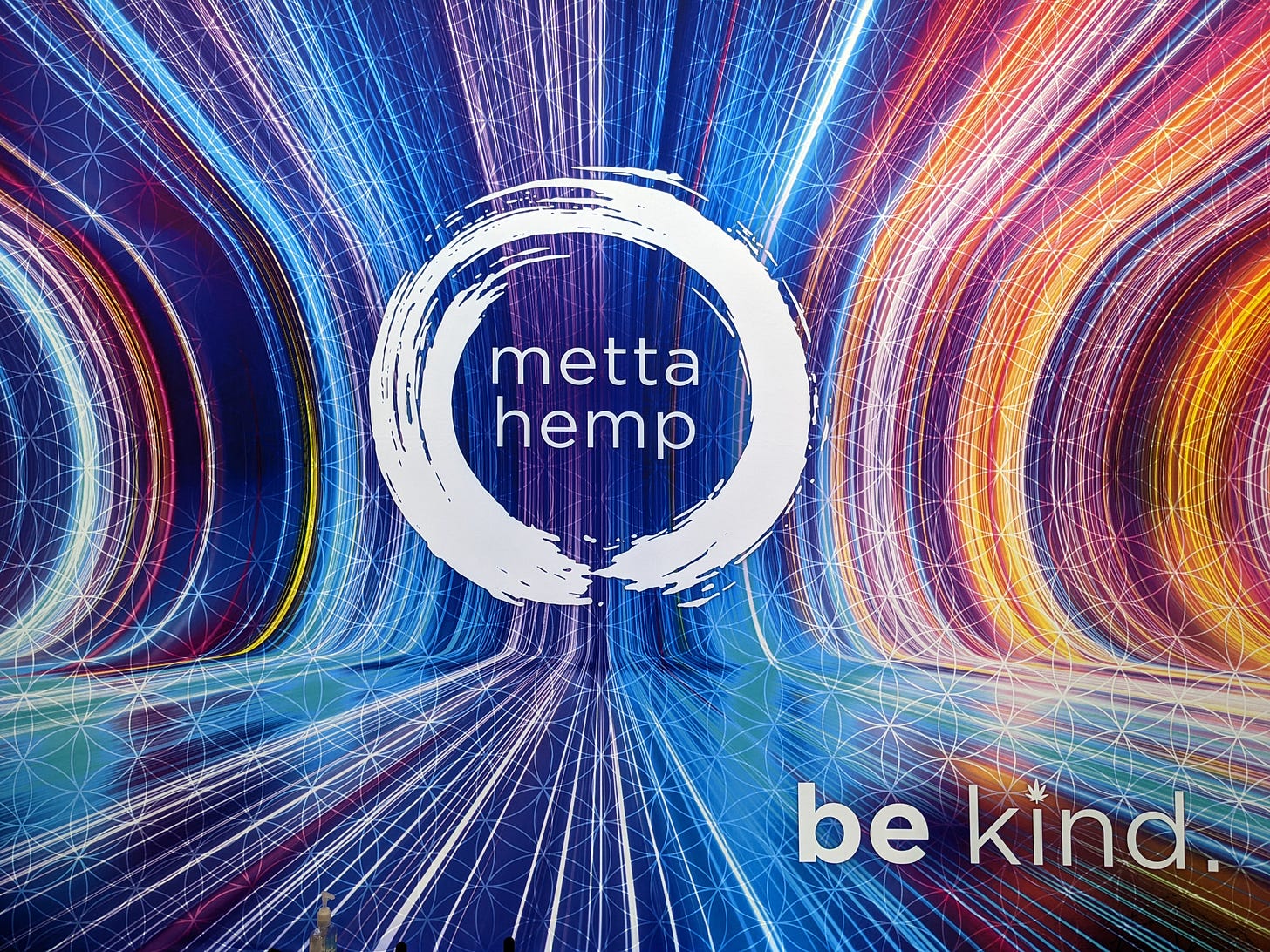
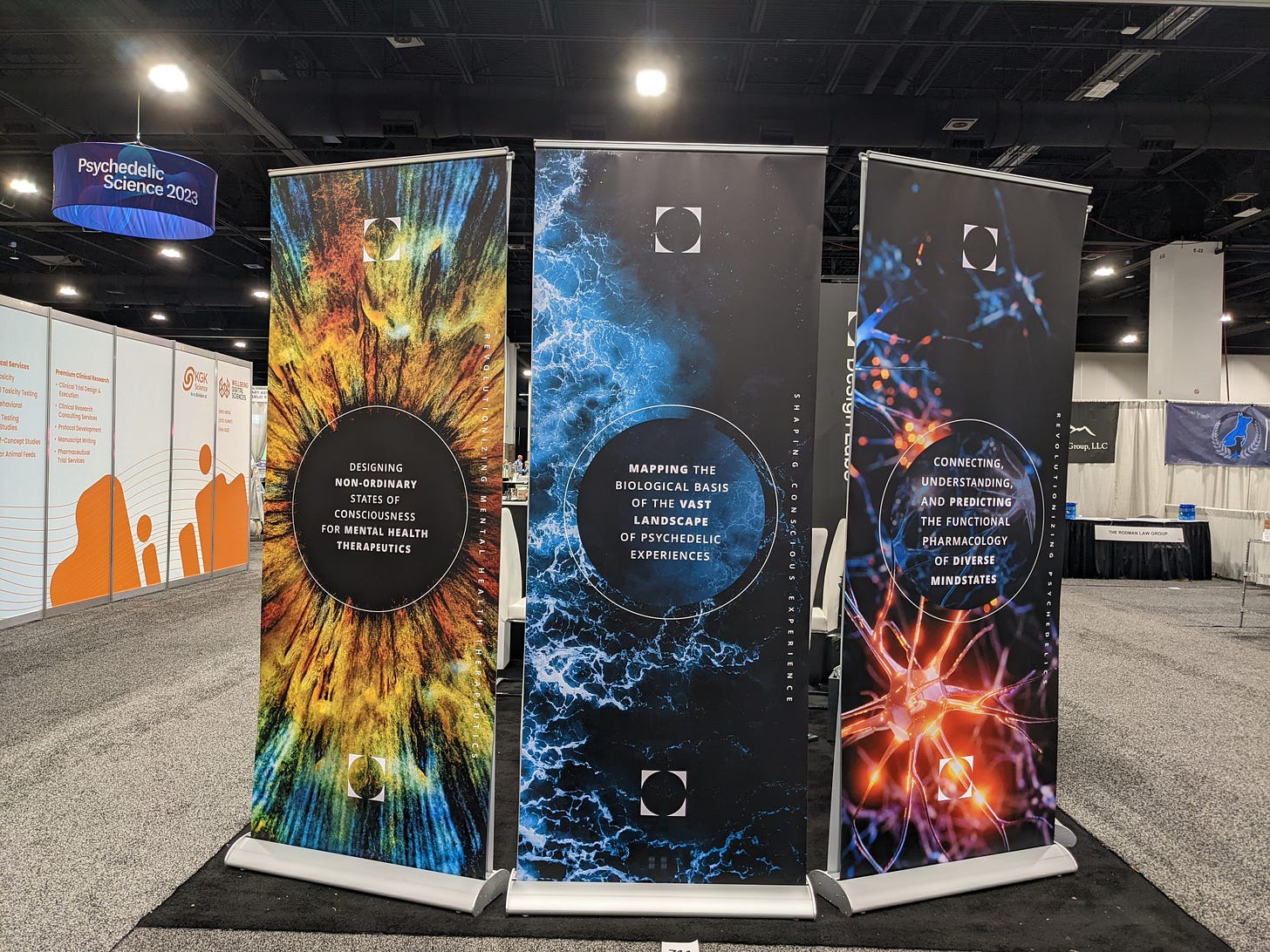
And many… many more…
The ninth thing you notice at PS23 are the big names are here. The Director of the National Institute of Mental Health, Joshua Gordon, gave a keynote address. Michael Pollen is signing books. Huberman of the Huberman Lab Podcast had a talk. The Jets quarterback Aaron Rodgers is sharing how psychedelics ‘radically changed his life’. India Oxenberg (below) shares how ketamine-assisted therapy helped overcome PTSD from the sexual trauma of the NXIVM cult (her story has an HBO/Netflix documentary).
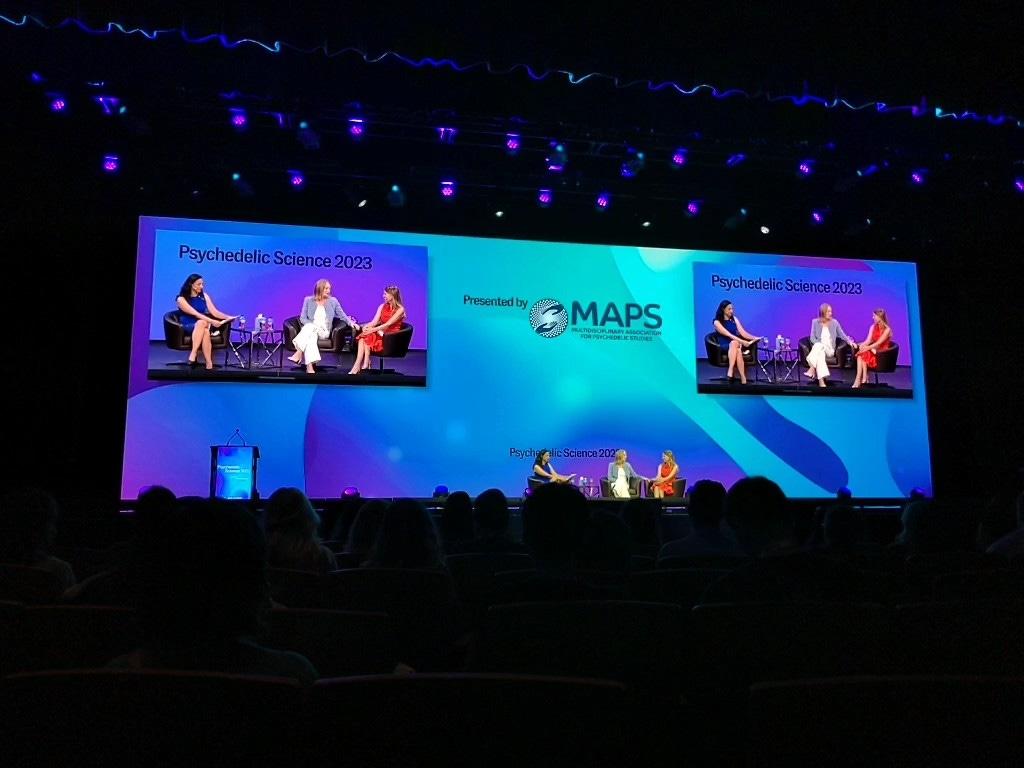
The tenth thing you notice at PS23 is if you look in enough nooks and crannies, you can find just about anything.
A camera, of course, won't capture everything. Tidbits that aren't captured with a camera include the following:
“Oh, that's Suzy. Her parents own <grocery-store-you've-probably-been-to>. She donates a lot to this space.”
“I prefer to use ayahuasca for my shadow work, but I guess to each their own.”
Someone breaking down in tears because this conference coincides with the pluto planet alignment.
My conversation with a priest from Boston over lunch who had a psychedelic experience that saved his relationship with God and deepened it beyond anything he previously knew possible. Now he feels stuck in a closet about his situation.
The cannabis and psilocybin signs in the emotional support animal booth emphasizing that their company uses "novel solutions for emotional disease in animals". Psilocybin for dogs? Really?
Dozens of stations with attendees wearing VR headsets, headphones, eye masks, tactile suits, etc. to have out-of-this-world (relaxing?) meditations and experiences.
The school bus turned party dragon that was on the second-floor dance floor. I don't know how it got there. Your imagination will be better than my crappy picture.
Being offered ‘truffle’ infused chocolate.
And much… much more….
Overall, the psychedelic space is a weird space with a lot of different actors and goals. I wouldn’t call it an academic conference3, but I look forward to the next one.
Defined as: visiting a country for an expensive psychedelic retreat that is devoid of cultural roots
If Relyvrio can get approved - I mean come on.
But it really could be if you wanted it to be

